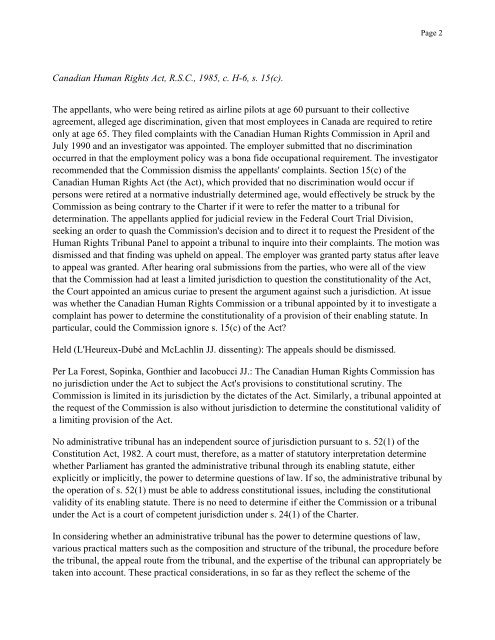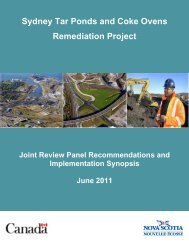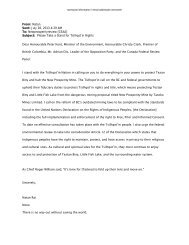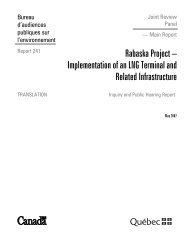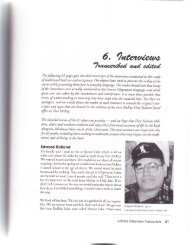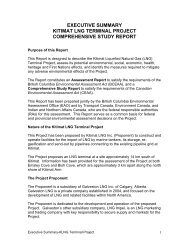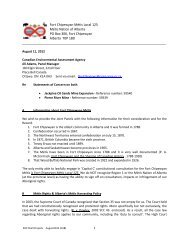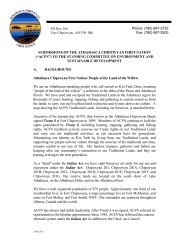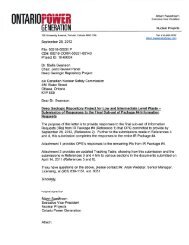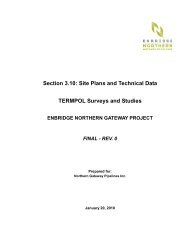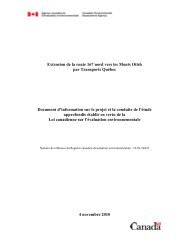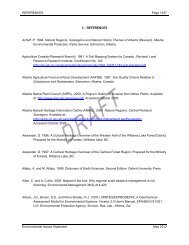Kearl Oil Sands Project
Kearl Oil Sands Project
Kearl Oil Sands Project
You also want an ePaper? Increase the reach of your titles
YUMPU automatically turns print PDFs into web optimized ePapers that Google loves.
Canadian Human Rights Act, R.S.C., 1985, c. H-6, s. 15(c).<br />
The appellants, who were being retired as airline pilots at age 60 pursuant to their collective<br />
agreement, alleged age discrimination, given that most employees in Canada are required to retire<br />
only at age 65. They filed complaints with the Canadian Human Rights Commission in April and<br />
July 1990 and an investigator was appointed. The employer submitted that no discrimination<br />
occurred in that the employment policy was a bona fide occupational requirement. The investigator<br />
recommended that the Commission dismiss the appellants' complaints. Section 15(c) of the<br />
Canadian Human Rights Act (the Act), which provided that no discrimination would occur if<br />
persons were retired at a normative industrially determined age, would effectively be struck by the<br />
Commission as being contrary to the Charter if it were to refer the matter to a tribunal for<br />
determination. The appellants applied for judicial review in the Federal Court Trial Division,<br />
seeking an order to quash the Commission's decision and to direct it to request the President of the<br />
Human Rights Tribunal Panel to appoint a tribunal to inquire into their complaints. The motion was<br />
dismissed and that finding was upheld on appeal. The employer was granted party status after leave<br />
to appeal was granted. After hearing oral submissions from the parties, who were all of the view<br />
that the Commission had at least a limited jurisdiction to question the constitutionality of the Act,<br />
the Court appointed an amicus curiae to present the argument against such a jurisdiction. At issue<br />
was whether the Canadian Human Rights Commission or a tribunal appointed by it to investigate a<br />
complaint has power to determine the constitutionality of a provision of their enabling statute. In<br />
particular, could the Commission ignore s. 15(c) of the Act?<br />
Held (L'Heureux-Dubé and McLachlin JJ. dissenting): The appeals should be dismissed.<br />
Page 2<br />
Per La Forest, Sopinka, Gonthier and Iacobucci JJ.: The Canadian Human Rights Commission has<br />
no jurisdiction under the Act to subject the Act's provisions to constitutional scrutiny. The<br />
Commission is limited in its jurisdiction by the dictates of the Act. Similarly, a tribunal appointed at<br />
the request of the Commission is also without jurisdiction to determine the constitutional validity of<br />
a limiting provision of the Act.<br />
No administrative tribunal has an independent source of jurisdiction pursuant to s. 52(1) of the<br />
Constitution Act, 1982. A court must, therefore, as a matter of statutory interpretation determine<br />
whether Parliament has granted the administrative tribunal through its enabling statute, either<br />
explicitly or implicitly, the power to determine questions of law. If so, the administrative tribunal by<br />
the operation of s. 52(1) must be able to address constitutional issues, including the constitutional<br />
validity of its enabling statute. There is no need to determine if either the Commission or a tribunal<br />
under the Act is a court of competent jurisdiction under s. 24(1) of the Charter.<br />
In considering whether an administrative tribunal has the power to determine questions of law,<br />
various practical matters such as the composition and structure of the tribunal, the procedure before<br />
the tribunal, the appeal route from the tribunal, and the expertise of the tribunal can appropriately be<br />
taken into account. These practical considerations, in so far as they reflect the scheme of the


